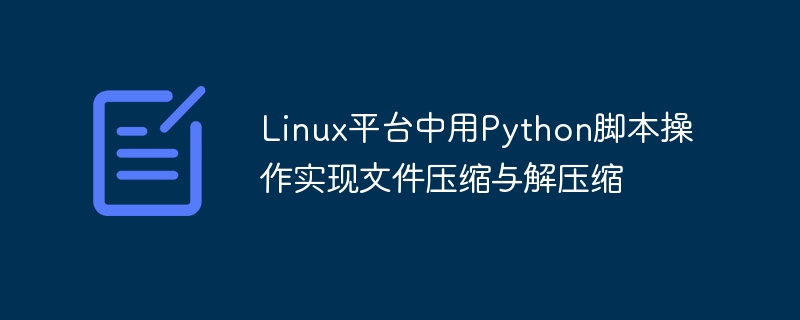

Using Python scripts to compress and decompress files on the Linux platform is a very convenient and efficient method. In this article, we will discuss how to use Python to write scripts to compress and decompress files, and provide specific code examples.
1. File Compression
File compression is to package and compress one or more files into a single file to reduce the space occupied by the file and the transmission time. In the Linux platform, we can use Python's zipfile module to implement file compression.
The following is an example that demonstrates how to use a Python script to compress files:
import zipfile
import os
def compress_files(source_dir, zip_file):
with zipfile.ZipFile(zip_file, 'w') as zipf:
for root, _, files in os.walk(source_dir):
for file in files:
file_path = os.path.join(root, file)
zipf.write(file_path, os.path.relpath(file_path, source_dir))
print('文件压缩完成!')
source_dir = '/path/to/source/dir' # 待压缩的文件夹路径
zip_file = '/path/to/zip/file.zip' # 压缩后的文件路径
compress_files(source_dir, zip_file)In this example, we define a compress_files function that receives two Parameters: source_dir and zip_file, respectively represent the folder path to be compressed and the compressed file path. In the function body, we use zipfile.ZipFile to create a ZipFile object, and then use os.walk to traverse all the files in the folder and write them to the compressed file.
After executing the above code, we can find a compressed file named file.zip under the specified path, which contains all the files in the source_dir folder document.
2. File decompression
File decompression is to restore the compressed file to the original file and restore the complete directory structure of the file. Similarly, we can use Python's zipfile module to decompress files.
The following is an example that demonstrates how to use a Python script to decompress files:
import zipfile
import os
def extract_files(zip_file, dest_dir):
with zipfile.ZipFile(zip_file, 'r') as zipf:
zipf.extractall(dest_dir)
print('文件解压缩完成!')
zip_file = '/path/to/zip/file.zip' # 待解压缩的文件路径
dest_dir = '/path/to/destination/dir' # 解压缩后文件的存放路径
extract_files(zip_file, dest_dir)In this example, we define an extract_files function that receives two Two parameters: zip_file and dest_dir, respectively represent the path of the file to be decompressed and the storage path of the decompressed file. In the function body, we use zipfile.ZipFile to create a ZipFile object, and then use the extractall function to extract the contents of the compressed file to the specified target folder.
After executing the above code, the contents of the compressed file will be restored to the target folder and the original directory structure will be maintained.
3. Summary
Using Python scripts to compress and decompress files is a very convenient and efficient method under the Linux platform. By using Python's zipfile module, we can easily implement file packaging, compression and decompression operations.
I hope the above code examples can help you and give you a better grasp of how to use Python scripts to compress and decompress files on the Linux platform. Happy writing!
The above is the detailed content of Using Python script operations to implement file compression and decompression on the Linux platform. For more information, please follow other related articles on the PHP Chinese website!




